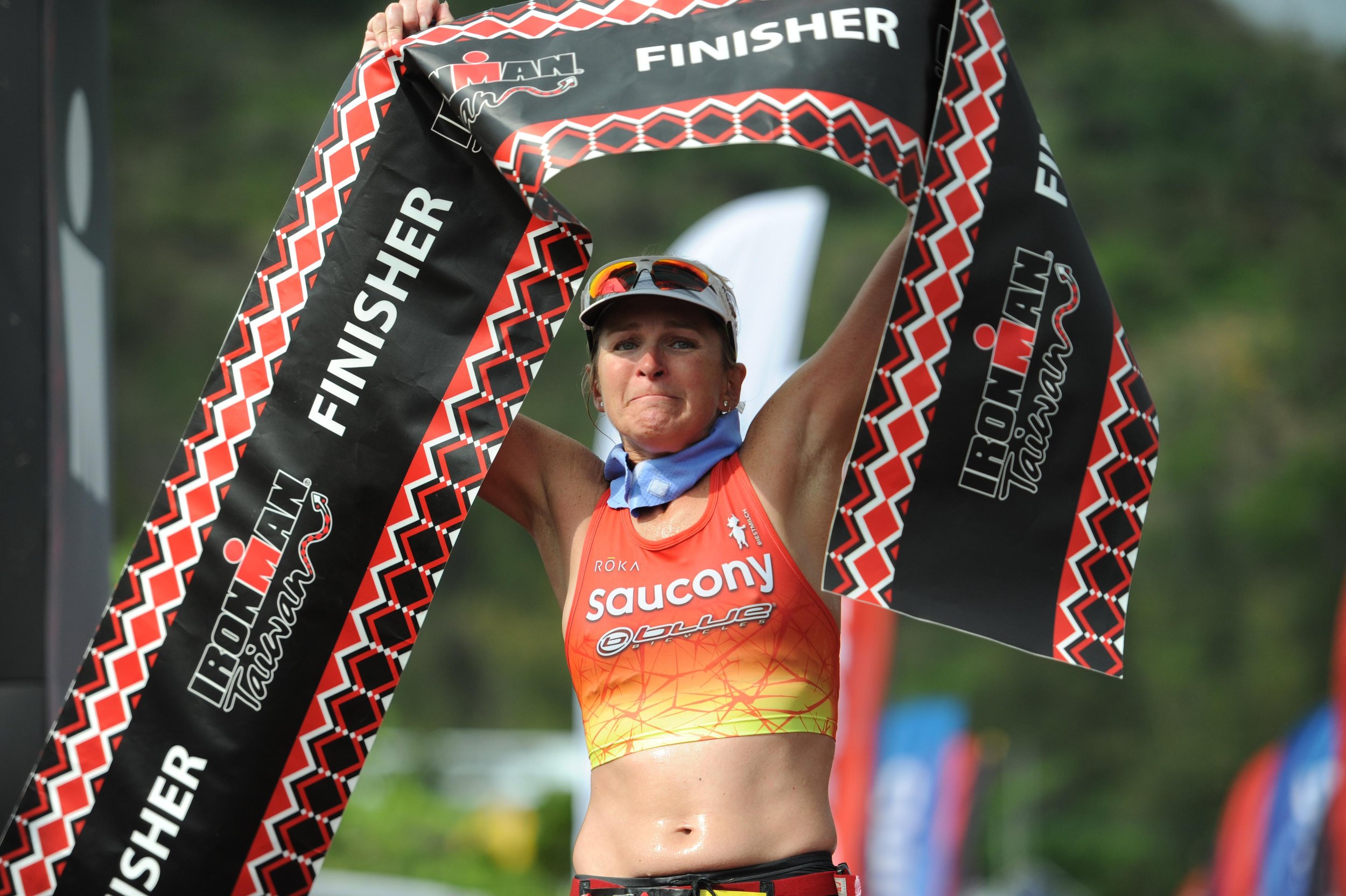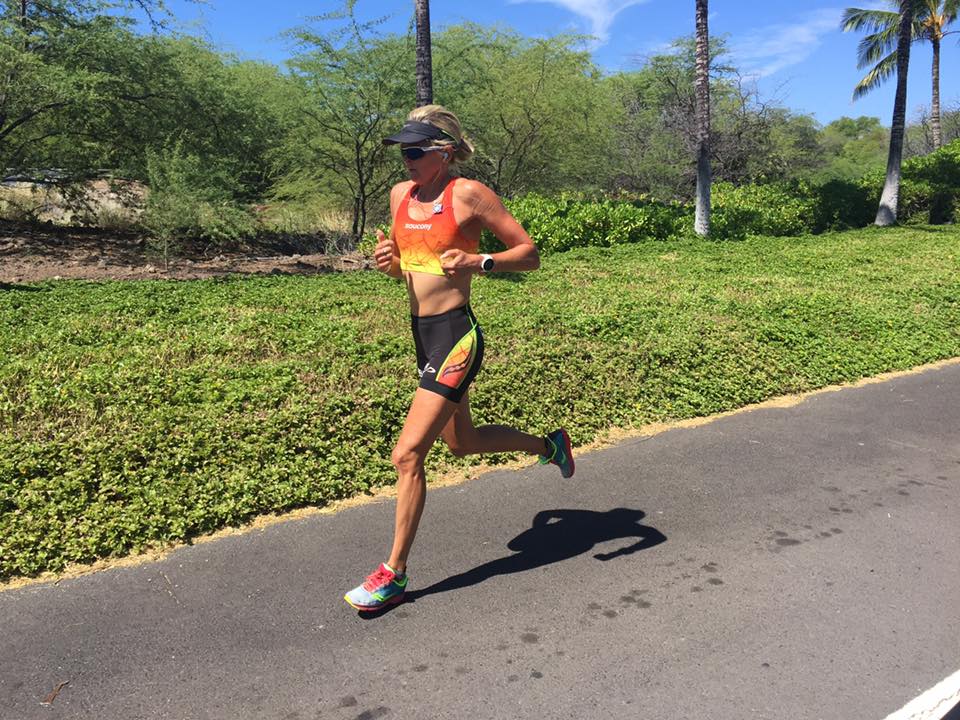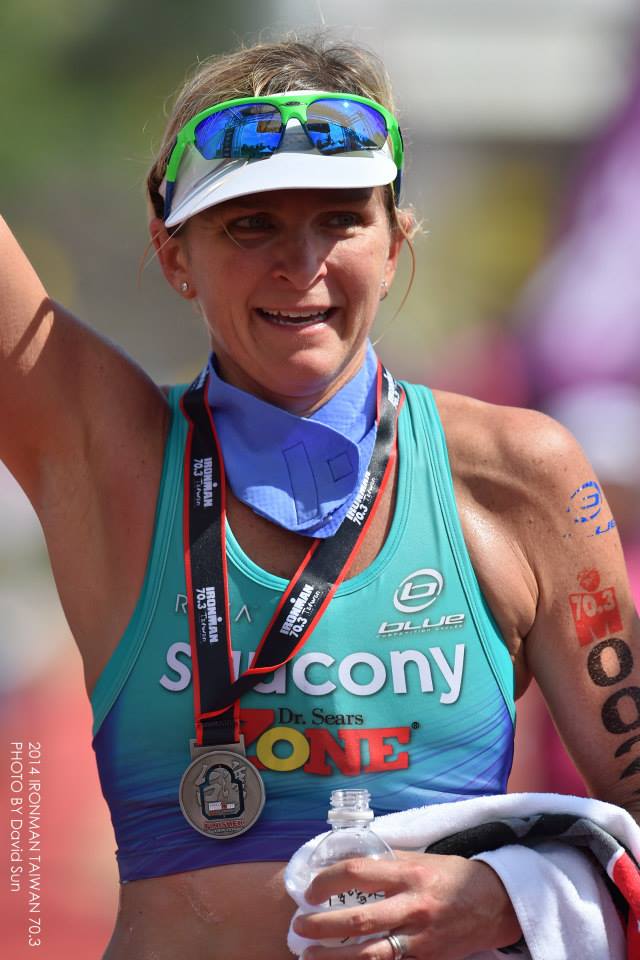1. How did you get involved with triathlon?
I sort of tripped into triathlon sideways. I came from a swimming background. I swam in college for Stanford University and represented the USA on the National Team at the Pan Pacific Games in 1989, the Goodwill Games in 1990 and the Pan American Games in 1991. Pulled up a little short of that Olympic team in 1992, unfortunately!
I retired from swimming, thinking that my career in sport was done. I spent the summer before business school riding my bike across the country with a boy I was trying to impress. Just a lesson? Good things never happen trying to impress a member of the opposite sex! I bought a bike and a week later, we flew to Seattle to start biking back to the East coast. We broke up in Montana. Then again in North Dakota. We did finish the trip, but the relationship did not survive!
While I was in business school, I ran my first marathon.
So the summer after business school, I had no money as I’d just paid for school. I didn’t really have a travel bug after the bike trip debacle, but I had 3 months off before I had to start work. I saw the Ironman on TV while I should have been studying for finals. I was hooked. I signed up and decided that was how I was going to spend my 3 months!
2. Were you competitive in other sports?
Mostly swimming, as I wasn’t really coordinated enough to do much else! I dabbled in tennis, soccer, crew and basketball. But ultimately, swimming was what “stuck”.
3. What are some of your career highlights in endurance sports?
I have 3 Ironman wins. Those were all pretty special for different reasons. The first…well, because it’s your first. The second was awesome because it proved, mostly to me, that the first wasn’t a fluke. The third was great because it came so much later in my career. I think people had / have written me off because of my age, but to win an Ironman at 44 proves that the body can achieve great things at any age!
Being top-10 in Kona 3 times was also a huge thrill because you know you are achieving that standard against the fittest in the world on their best day.
Another major highlight would be my win at the 12 hour Time Trial World Championships. I was injured for most of 2016, but could still ride, so my coach found this event. It was a great outlet for me while I rehabilitated some run-related injuries. I am proud of it because it took me out of my comfort zone and I made good use of my “down time”. It was a productive endeavor. I could have sat around and sulked thru my injuries, but I think I really got something out of that race.
4. What brought you to Boulder for training?
My coach at the time. She moved back to Boulder from California, so Boulder became our new training base. I was “commuting” from Boston, but when my husband came out for a visit one weekend, one thing led to another and we decided to move here. It’s been a great move and I think living in Boulder has extended my years in the sport.
5. Tell us a little bit about your training philosophy, especially in relation to staying healthy and injury free.
My philosophy might need some tinkering, if you look at the last year! I’ve had a string of injuries; seemingly unrelated, but in succession, all quite frustrating. I have a great coach (Julie Dibens) and I believe very strongly in the work we’re doing. Julie looks at coaching as both an art and a science. After my injuries, I had to look deeper at what was causing them. Nutrition proved to be a big contributor to some of my issues. So I guess my “philosophy” is that even the small things matter; rest, recovery, sleep, nutrition….those are way more important than I gave credit to for a long time. The small details matter, especially as I get older. I can’t get away with things I used to get away with!
6. What’s your favorite recovery food?
I make a wicked good smoothie with fresh fruit, protein and other supplements with awesome micro-nutrients. It hits the spot. And in the summer? Watermelon! While it’s mostly water, it’s good for hydration, vitamin A, B6, C and antioxidants….plus, it’s just refreshing after a long, hot day of training!
7. How important are the small things, like stretching, weight-lifting?
I actually don’t look at weight lifting as a “small thing”. Good movement is the key to a long, happy, healthy career. I do 3 dedicated gym sessions per week with my strength coach, Amy Quirion at Rally Sport. We focus on mobility, stability, agility and strength. I’ve been a big believe in gym work and have worked with a dedicated strength coach since 2007; two different ones in Boston (Eric Cressey, and Kevin Carr from Mike Boyle Strength and Conditioning). Since moving to Boulder, I’ve worked with Amy.
In Amy, I’ve found someone who understands the demands of my sport. Amy’s not afraid to throw heavy weights in my hands, but also knows how to back up and make sure I’m moving well before she’s willing to do that. There’s a time and a place for everything! Amy knows what my training schedule is, so she caters each workout to what’s going on around it.
8. What role does Physical Therapy play in your training?
I am a big believer in regular physical therapy appointments, even when I’m healthy. A good physical therapist will watch you move and see where you may be “off”; tight, imbalanced, or weak. Having a keen set of eyes and hands on you to check in is paramount in preventing injuries before they happen. If you can prevent an injury from happening, that’s way better than going thru the ordeal of recovering from an injury. So even when I am healthy, I keep you guys on speed dial to make sure I stay that way. On my non-gym days, I spend 20-30 minutes doing PT related preventative exercises on areas I know to be my “weakness”. It helps.
9. How many workouts a week are you completing?
I think it’s about 19 per week? It’s usually 3 sessions per day with 2 days of 2 sessions.
10. If you could be successful at any other sport, what would it be and why?
Golf. Well, that’s not entirely true. I’m not sure I could be successful at it because I’m not very good, and I think it’s rather boring, but I’d like to be good at it. I’d have made a lot more money as a professional than I do in triathlon!
11. What advice would you give an individual looking at registering for their first triathlon? Advice for an amateur thinking about turning pro?
To an individual looking to register in their first triathlon? Just go have fun with it! Truly. I think too many people take themselves WAY too seriously in this sport sometimes. It’s meant to be fun. We’re not negotiating world peace here or splitting the atom. This is an awesome life-style and a fun way to spend a Saturday. Keep fun at the forefront. That said, I think it’s also important that you be safe, so if you aren’t a competent swimmer, hire a coach and take some lessons. Train in open water before you do a triathlon; it’s far different that pool swimming. And learn how to ride and handle a bike. As triathlon becomes more popular, courses are more crowded. You have athletes of very different abilities out there which is inspiring for everyone involved. But you have to know how to handle yourself! Your inexperience, or twitchy-ness on the bike could cause an accident, so be sure you can handle yourself on a race course before you jump into action!
To an amateur looking to turn pro? I’d say hold off. Or at least consider turning pro, but continue to work. Being a pro is a hard, HARD way to earn a living. Some of that is on the pros who don’t look to make themselves a valuable asset to sponsors; yes, we are out there as professional athletes and yes, they want us crossing the line first. But there’s a lot more to it than that. Even from the pros who do see “the big picture” of being a pro, opportunities to earn a living at it are shrinking rapidly. I hope there’s a round-about in the future where pros and sponsors alike can reverse the trend, but for now, I’d say my advice is to say, sure….make the leap. But don’t quit your day job!



